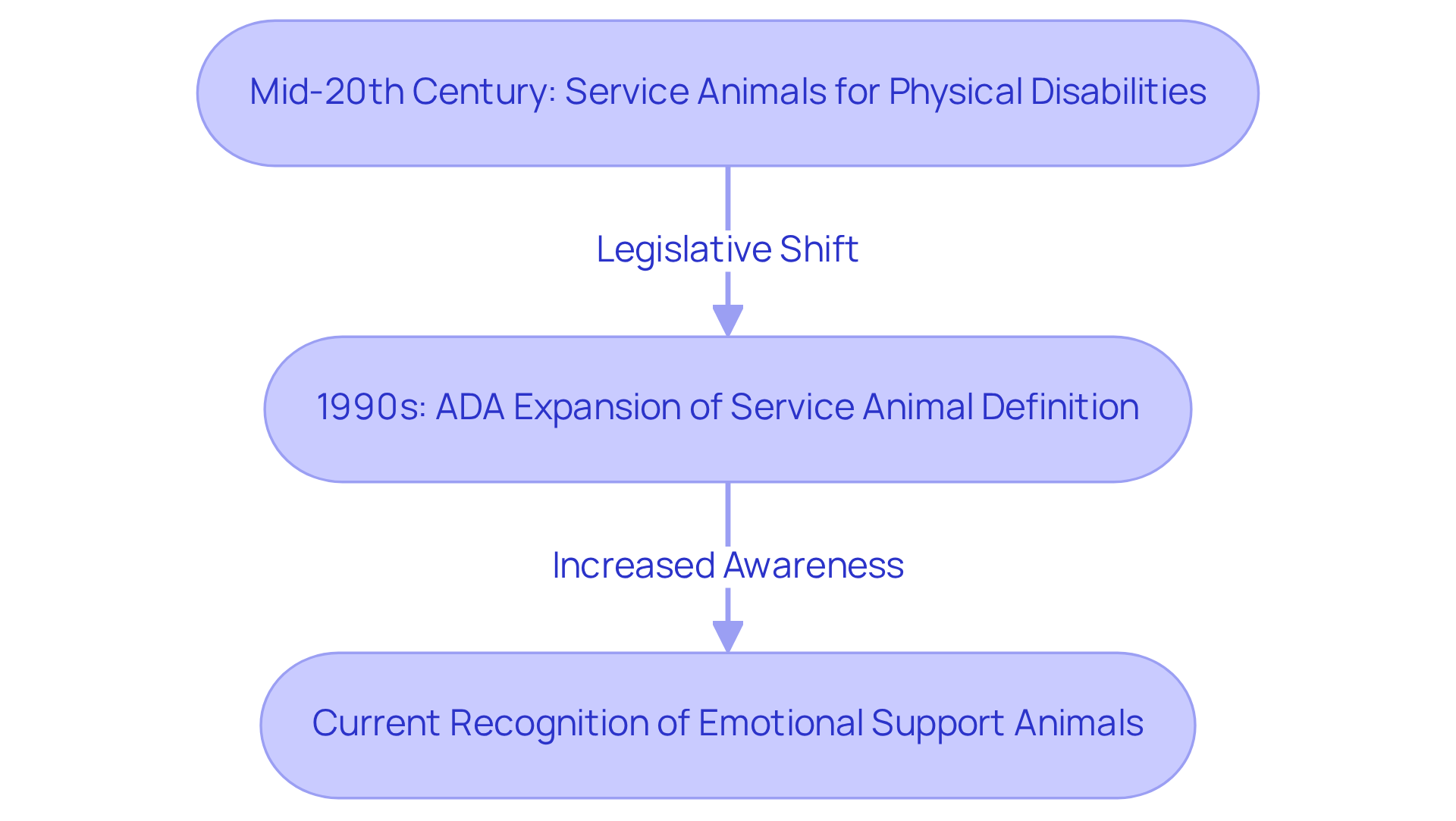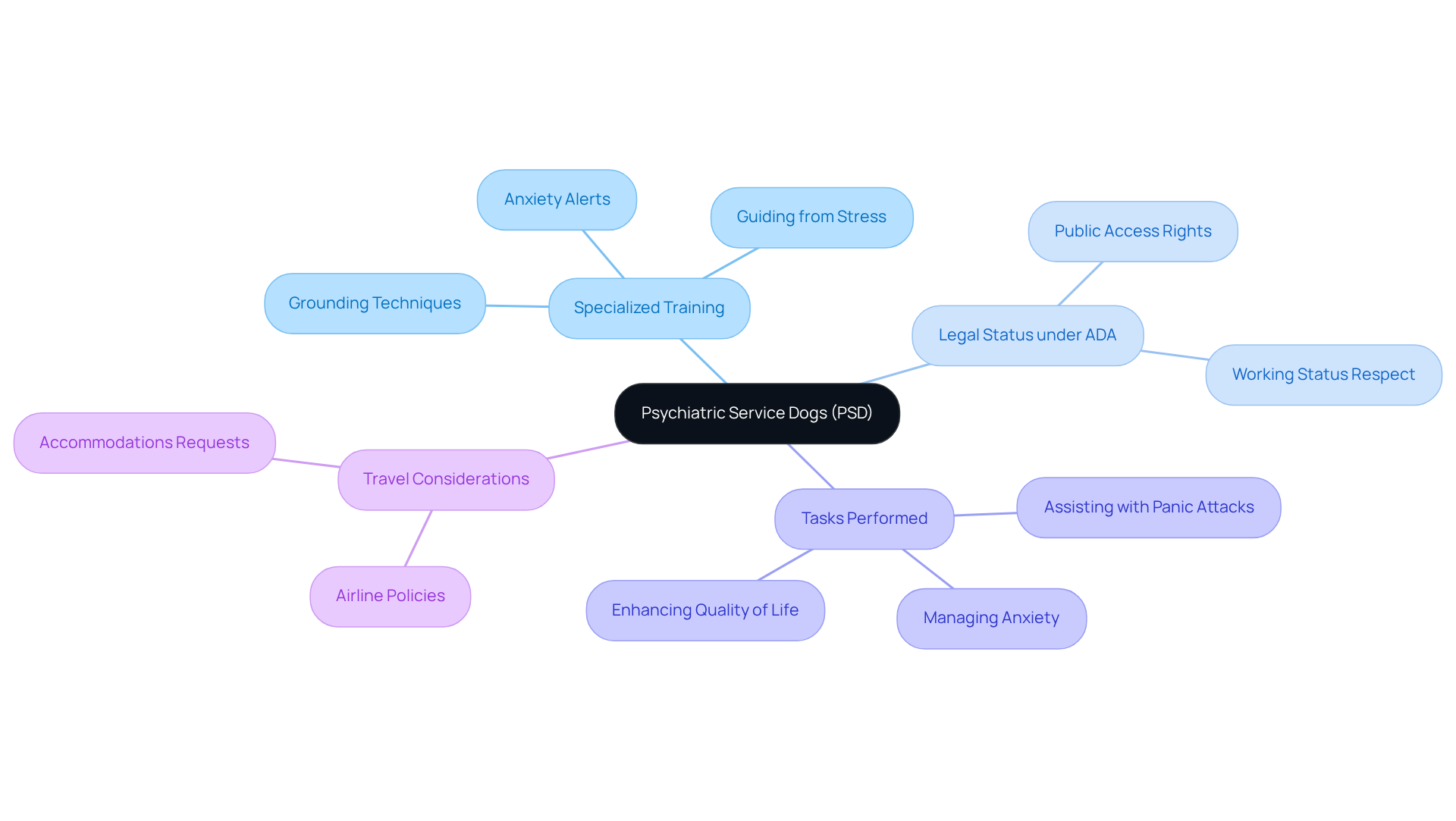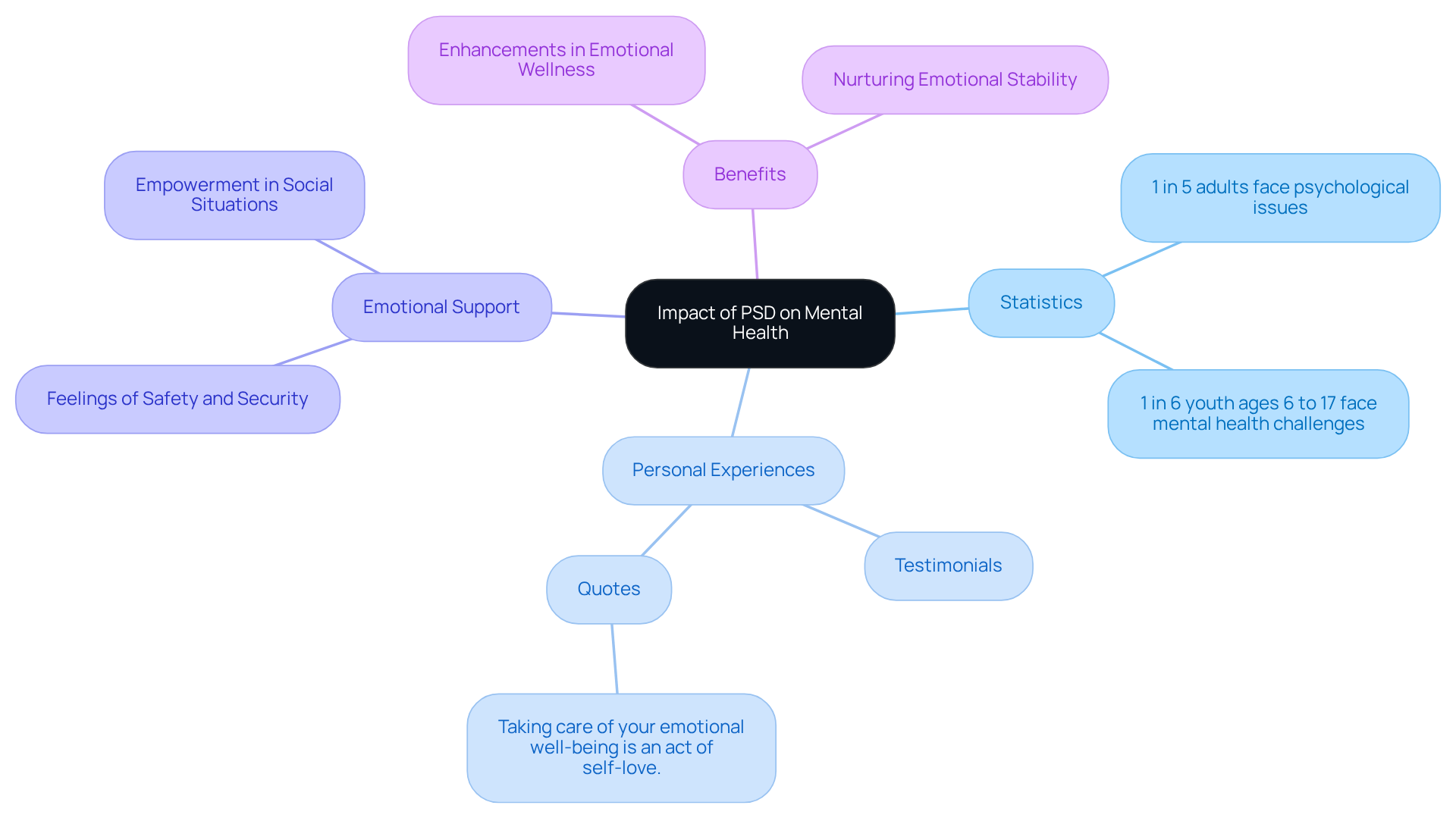

Whats a PSD: Definition, Origins, and Key Characteristics
by Lena Park
Last updated: July 17, 2025
Verified and Approved by:
Angela Morris,
MSW, LCSW
Fact Checked

Overview
Psychiatric Service Dogs (PSDs) serve as specialized companions, meticulously trained to perform essential tasks that ease the burden of mental health conditions. For individuals grappling with disorders such as PTSD and anxiety, these remarkable animals offer invaluable support.
Imagine the relief of having a loyal friend who can sense the onset of an anxiety attack, alerting you in time to take a breath and regain your composure. PSDs not only enhance emotional stability but also significantly uplift the quality of life for those facing these challenges. Their presence can be a comforting reminder that you are not alone on this journey.
Introduction
Understanding the role of Psychiatric Service Dogs (PSDs) is crucial in a world where mental health challenges are increasingly recognized. Many individuals face emotional struggles that can feel overwhelming, and these specially trained animals offer more than mere companionship; they perform essential tasks that can significantly enhance the lives of those suffering from conditions like PTSD and anxiety disorders.
But how do these remarkable dogs truly transform emotional well-being? Furthermore, what legal protections do they possess? By exploring the definition, origins, and key characteristics of PSDs, we uncover a profound connection between human mental health and the companionship of these incredible animals, providing a source of hope and support for those in need.
Define PSD: Understanding the Concept and Its Relevance
A Psychiatric Service Dog, often referred to as what’s a PSD, serves as a specialized assistance animal, uniquely trained to perform specific tasks that alleviate the symptoms of mental health conditions. For many individuals, the emotional challenges can feel overwhelming. Unlike emotional support animals (ESAs), which primarily offer comfort through companionship, psychiatric service dogs are equipped to perform essential tasks that aid those with mental health disabilities. These tasks can range from alerting their handler to impending anxiety attacks to providing deep pressure therapy during distress episodes or even reminding them to take vital medications.
The significance of these support systems is profound, as they can greatly enhance the quality of life for individuals grappling with conditions such as PTSD, anxiety disorders, and severe depression. Imagine the relief when a service dog alerts a veteran to an anxiety attack, allowing them to regain control. Studies reveal that veterans matched with service dogs experience a remarkable 66% decrease in the likelihood of receiving a PTSD diagnosis, underscoring the transformative impact these animals can have on psychological well-being.
Furthermore, it’s noteworthy that 52% of service dog tasks focus on calming or comforting anxiety, highlighting their critical role in fostering emotional stability and independence for those in need. As we move through 2025, the importance of personal support documents continues to grow, providing vital assistance to individuals facing the challenges of mental health concerns. Remember, you are not alone in this journey; support is available, and these incredible dogs can make a significant difference in your life.

Trace the Origins of PSD: Historical Context and Evolution
The journey of Psychiatric Service Dogs, or what’s a PSD, begins within the broader movement advocating for the recognition of service animals, which gained significant momentum in the mid-20th century. Initially, service animals were primarily associated with assisting individuals with physical disabilities, such as guiding those who are visually impaired. Yet, as our understanding of psychological challenges evolved, so too did the perception of animals as vital sources of emotional support.
A pivotal moment occurred in the 1990s with the Americans with Disabilities Act (ADA), which expanded the definition of service animals, prompting the question: what’s a PSD for those who assist individuals with psychiatric disabilities? This legislative shift not only formalized the acknowledgment of service dogs but also highlighted the growing awareness of the importance of psychological well-being and the therapeutic benefits that animals can offer.
Today, the recognition of emotional support animals signifies a profound transformation in societal views regarding the bond between psychological health and animal companionship. It opens doors for more inclusive support systems for those navigating the complexities of mental health challenges.
Have you ever considered how a loving animal could enhance your emotional well-being? As we reflect on these changes, it’s essential to recognize the support available to individuals facing such challenges, ensuring they feel understood and cared for.

Identify Key Characteristics of PSD: Components and Features
When discussing the unique qualities of Psychiatric Service Dogs, it’s important to understand what’s a PSD, as they stand out due to their specialized training, the vital tasks they carry out, and their recognized legal status under the Americans with Disabilities Act (ADA). These remarkable dogs undergo extensive training to perform specific tasks that assist their handlers in managing mental health conditions. For example, they may:
- Offer grounding techniques during panic attacks
- Alert handlers to signs of anxiety
- Guide them away from stressful situations
Thus, enhancing their quality of life.
The legal recognition of service dogs under the ADA is incredibly important, as it grants them access to public spaces where pets typically cannot go. This legal framework is essential for individuals who depend on their personal support devices for daily functioning and emotional support. Moreover, service dog owners enjoy complete public access rights, allowing them to bring their psychiatric service dogs into various public settings, including restaurants and public transportation. It is vital to respect the working status of these service dogs and to refrain from distracting or petting them without the handler’s permission, as this can disrupt their tasks and compromise the safety and well-being of the handler.
When traveling with a PSD, it’s crucial to follow specific airline policies, such as those set by Air Canada. Travelers are encouraged to reach out to the Air Canada Medical Assistance Desk at 800-667-4732 at least 48 hours prior to their flight to inform them about their service dog and request any necessary accommodations, such as additional floor space. This combination of specialized training, legal protections, and adherence to travel protocols underscores the importance of personal support devices, leading to the question of what’s a PSD for those facing psychological challenges, particularly individuals encountering housing limitations or travel barriers due to their circumstances.

Explore the Importance of PSD: Impact on Mental Health and Emotional Support
The significance of Psychiatric Service Dogs (PSDs) in psychological care raises the question, what’s a PSD, and is truly profound, especially for individuals navigating the challenges of conditions like PTSD. Each year, studies reveal that 1 in 5 adults in the U.S. confront a psychological issue, and the presence of a PSD can lead to remarkable decreases in symptoms associated with anxiety, depression, and PTSD.
Many individuals with PTSD share that they experience a heightened sense of safety and security when accompanied by their PSD, empowering them to engage in public spaces and social situations that might otherwise feel daunting. This companionship nurtures emotional stability and resilience, which are vital for mental recovery.
One individual with a PSD beautifully expressed, “Taking care of your emotional well-being is an act of self-love,” highlighting the importance of prioritizing psychological wellness.
As awareness of the benefits of personal support devices, or ‘whats a psd’, continues to grow, they are increasingly recognized as essential components of comprehensive mental health care, providing not just assistance but also a pathway to enhanced emotional wellness.
Testimonials from those with PSDs further illuminate their transformative impact, illustrating how these remarkable animals contribute to recovery and enrich lives.

Conclusion
Psychiatric Service Dogs (PSDs) are more than companions; they are essential allies in the journey of individuals facing mental health challenges. These specially trained animals perform tasks that alleviate symptoms of PTSD, anxiety, and severe depression, significantly enhancing the quality of life for their handlers. The evolution of the PSD concept reflects a growing recognition of the vital role psychological well-being plays in our lives, along with the therapeutic benefits these remarkable animals offer.
In this article, we explored the definition, origins, and characteristics of PSDs. From their historical context in the mid-20th century to the legislative milestones that acknowledged their role under the Americans with Disabilities Act, the journey of PSDs underscores their invaluable contribution to mental health care. We emphasized the specialized training that equips them to perform critical tasks, the legal protections they enjoy, and the profound impact they have on emotional stability and resilience, showcasing their role as essential support systems.
The significance of Psychiatric Service Dogs transcends individual experiences, reflecting a broader societal understanding of the importance of mental health support. As awareness grows, it becomes increasingly vital to advocate for the recognition and acceptance of PSDs in various environments. This advocacy ensures that those who benefit from their companionship feel understood and supported. Embracing these incredible animals can lead to transformative changes in mental health care, empowering individuals to reclaim their lives and thrive on their paths to emotional well-being.
Frequently Asked Questions
What is a Psychiatric Service Dog (PSD)?
A Psychiatric Service Dog (PSD) is a specialized assistance animal trained to perform specific tasks that alleviate the symptoms of mental health conditions.
How do PSDs differ from emotional support animals (ESAs)?
Unlike emotional support animals, which primarily provide comfort through companionship, PSDs are trained to perform essential tasks that assist individuals with mental health disabilities.
What types of tasks can a Psychiatric Service Dog perform?
PSDs can perform various tasks, including alerting their handler to impending anxiety attacks, providing deep pressure therapy during distress episodes, and reminding them to take vital medications.
What mental health conditions can benefit from the assistance of a PSD?
PSDs can significantly enhance the quality of life for individuals dealing with conditions such as PTSD, anxiety disorders, and severe depression.
What impact do service dogs have on veterans with PTSD?
Studies show that veterans matched with service dogs experience a 66% decrease in the likelihood of receiving a PTSD diagnosis, highlighting the transformative impact these dogs can have on psychological well-being.
What percentage of service dog tasks focus on calming or comforting anxiety?
Approximately 52% of service dog tasks are focused on calming or comforting anxiety, emphasizing their role in fostering emotional stability and independence for individuals in need.
Why are personal support documents important for individuals with mental health concerns?
Personal support documents provide vital assistance to individuals facing mental health challenges, and their importance continues to grow as more people recognize the benefits of support systems like PSDs.
Certify Your Emotional Support Animal Today

Why You Can Rely on Us?
At Wellness Wag, we believe your pet deserves care rooted in both science and compassion. Each article is carefully researched, written in clear language for pet owners, and then reviewed by qualified professionals to ensure the information is evidence-based, current, and practical for real-life care. Our goal is to help you feel confident in making informed decisions about your pet’s health and well-being.
Reviewed by
Angela Morris, MSW, LCSW
Angela is a licensed clinical social worker with 20 years of experience in patient advocacy and community mental health. She has assisted numerous clients with ESA evaluations and brings a deep understanding of disability accommodations, ensuring that all information is accurate, supportive, and practical.

Written by :
Lena Park
Last Updated :
July 17, 2025












